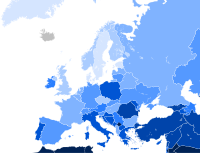
Back الدين في أوروبا Arabic Religió a Europa Catalan Náboženství v Evropě Czech Religión en Europa Spanish Uskonto Euroopassa Finnish Religion en Europe French Religije u Europi Croatian A vallás Európában Hungarian Religioni in Europa Italian Религии во Европа Macedonian
| Religion by country |
|---|
|
|


Religion has been a major influence on the societies, cultures, traditions, philosophies, artistic expressions and laws within present-day Europe. The largest religion in Europe is Christianity.[1] However, irreligion and practical secularisation are also prominent in some countries.[2][3] In Southeastern Europe, three countries (Bosnia and Herzegovina, Kosovo and Albania) have Muslim majorities, with Christianity being the second-largest religion in those countries. Ancient European religions included veneration for deities such as Zeus. Modern revival movements of these religions include Heathenism, Rodnovery, Romuva, Druidry, Wicca, and others. Smaller religions include Indian religions, Judaism, and some East Asian religions, which are found in their largest groups in Britain, France, and Kalmykia.
Little is known about the prehistoric religion of Neolithic Europe. Bronze and Iron Age religion in Europe as elsewhere was predominantly polytheistic (Ancient Greek religion, Ancient Roman religion, Basque mythology, Finnish paganism, Celtic polytheism, Germanic paganism, etc.).
The Roman Empire officially adopted Christianity in AD 380. During the Early Middle Ages, most of Europe underwent Christianization, a process essentially complete with the Christianization of Scandinavia in the High Middle Ages. The notion of "Europe" and the "Western World" has been intimately connected with the concept of "Christendom", and many even consider Christianity as the unifying belief that created a European identity,[4] especially since Christianity in the Middle East was marginalized by the rise of Islam from the 8th century. This confrontation led to the Crusades, which ultimately failed militarily, but were an important step in the emergence of a European identity based on religion. Despite this, traditions of folk religion continued at all times, largely independent from institutional religion or dogmatic theology.
The Great Schism of the 11th century and Reformation of the 16th century tore apart Christendom into hostile factions, and following the Age of Enlightenment of the 18th century, atheism and agnosticism have spread across Europe. Nineteenth-century Orientalism contributed to a certain popularity of Hinduism and Buddhism, and the 20th century brought increasing syncretism, New Age, and various new religious movements divorcing spirituality from inherited traditions for many Europeans. Recent times have seen increased secularisation and religious pluralism.[5]
- ^ "Europe". Encyclopædia Britannica. Retrieved 15 January 2016.
Most Europeans adhere to one of three broad divisions of Christianity: Roman Catholicism in the west and southwest, Protestantism in the north, and Eastern Orthodoxy in the east and southeast
- ^ "Special Eurobarometer, biotechnology, page 204" (PDF). Fieldwork: Jan–Feb 2010. Archived from the original (PDF) on 15 December 2010.
- ^ "Religiously Unaffiliated". Pew Research Center's Religion & Public Life Project. 18 December 2012. Retrieved 22 February 2015.
- ^ Dawson, Christopher; Glenn Olsen (1961). Crisis in Western Education (reprint ed.). CUA Press. p. 108. ISBN 9780813216836.
- ^ Hans Knippenberg (2005). The Changing Religious Landscape of Europe. Amsterdam: Het Spinhuis. pp. 7–9. ISBN 90-5589-248-3.
© MMXXIII Rich X Search. We shall prevail. All rights reserved. Rich X Search